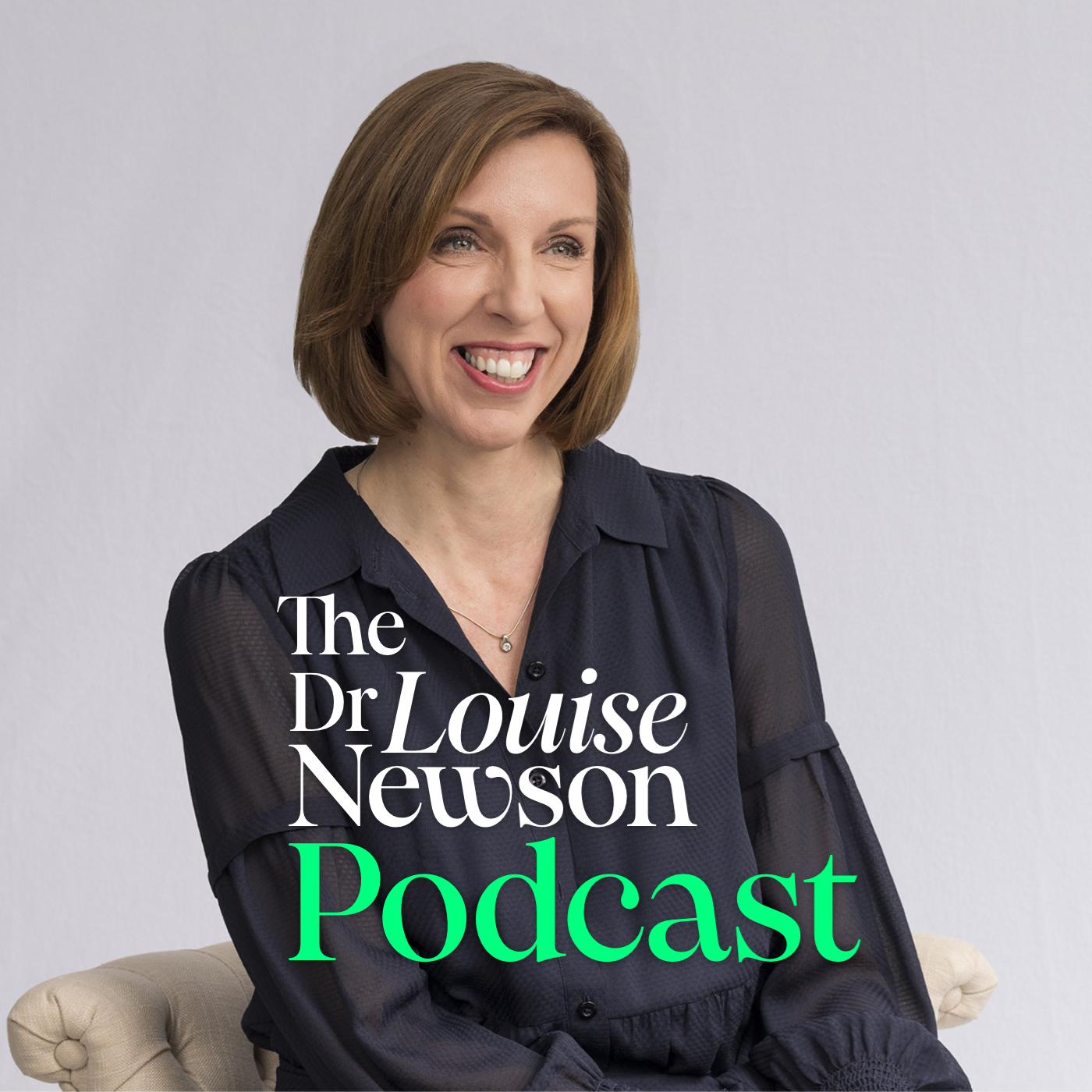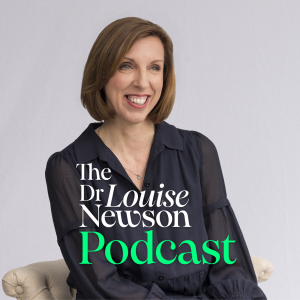
8.5M
Downloads
311
Episodes
Dr Louise Newson is an award-winning physician, respected women’s hormone specialist, educator, and author committed to increasing awareness and knowledge of perimenopause, menopause, and lifelong hormone health. Each week, Louise dives into the newest research, treatments and hot topic issues, providing accessible, evidence-based information to empower your future health. Joined by fellow experts and special guests, with answers to your burning questions, Louise explores how hormones impact every aspect of our lives. Described as the “medic who kickstarted the menopause revolution”, Louise aims to empower a generation of women to have a greater understanding, choice and control over their treatment, bodies, minds and future health through their hormones. She is the creator of the award-winning free balance app, a Sunday Times bestselling author and the founder of the Newson Health clinic. With over three decades of clinical experience, Louise is a member of the Royal College of Physicians, a Fellow of the Royal College of GPs, a Visiting Fellow at Cambridge, a regular contributor to academic journals including the Lancet and the British Journal of General Practice, and has been awarded an honorary Doctorate of Health from Bradford University. DISCLAIMER: The information provided in this podcast is for informational purposes only and is not intended as a substitute for professional medical advice, diagnosis, or treatment. Always seek the advice of your physician or other qualified health providers with any questions you may have regarding a medical condition. The views expressed by guests are their own and do not necessarily reflect the views of Dr Louise Newson or the Newson Health Group.
Episodes

Tuesday Nov 12, 2024
282 - Motor neurone disease and perimenopause: Nicola's story
Tuesday Nov 12, 2024
Tuesday Nov 12, 2024
This week, Dr Louise is joined by Nicola McFarlane, who was diagnosed with motor neurone disease (MND) in 2023.
Nicola shares the story of her MND diagnosis, as well as the barriers she faced in accessing treatment for perimenopause symptoms – including low mood, anxiety and recurrent UTIs – to improve her quality of life.
Nicola talks about how health professionals often put her perimenopause symptoms (which pre-dated her MND diagnosis) down to her MND, and why she is sharing her own experiences to help other women living with MND and facing hormonal changes.
For more information on Newson Health, click here.

Tuesday Nov 05, 2024
281 - Blind spots in modern medicine, with Dr Marty Makary
Tuesday Nov 05, 2024
Tuesday Nov 05, 2024
On this week’s episode Dr Louise is joined by Dr Marty Makary, Johns Hopkins professor, member of the National Academy of Medicine and bestselling author.
Together they discuss the impact of the Women’s Health Initiative study on women’s hormone health, menopause education for healthcare professionals and the importance of patient-centred care that focuses on root causes, rather than just symptoms.
Dr Marty talks about his new book Blind Spots, and the importance of asking big questions in medicine.
You can follow Dr Marty on Instagram @martymakary, and TikTok @marty.makary
For more information on Newson Health, click here.
Dr Louise Newson’s first-ever live theatre tour, Hormones and Menopause – The Great Debate, runs until 12 November. For more information and tickets, click here.

Tuesday Oct 29, 2024
280 - What is lifestyle medicine and how can it help your menopause?
Tuesday Oct 29, 2024
Tuesday Oct 29, 2024
Joining Dr Louise this week are Dr Tash Mirando and Dr June Tan Sheren, who are GPs based at Osler Health International in Singapore.
Dr Tash and Dr June explain the pillars of lifestyle medicine, including sleep, nutrition and exercise, and talk about longevity and the importance of taking a holistic approach to menopause care.
They also discuss menopause care in Singapore, bust myths on how menopause can affect women of different ethnicities and highlight the importance of knowledge and empowerment in making informed decisions about your health.
You can find out more about Osler Health International on Instagram @oslerhealth.sg and Facebook at oslerhealthsingapore.
For more information on Newson Health, click here.
Dr Louise Newson’s first-ever live theatre tour, Hormones and Menopause – The Great Debate, runs until 12 November. For more information and tickets, click here.

Tuesday Oct 22, 2024
Tuesday Oct 22, 2024
Cardiovascular disease is the leading cause of death in women and this risk increases after the menopause, and a woman’s risk of heart attack is around five times higher after the menopause than before*.
Joining Louise on this week’s podcast is Dr Jeremy London, a board-certified cardiothoracic surgeon based in the US, to discuss heart health, hormones and menopause.
They discuss the role of oestrogen in reducing inflammation in the body, why women typically present with different heart attack symptoms compared to men – and the signs to look out for – and the crucial role of nutrition and exercise in maintaining good heart health.
Finally, Dr London shares his top three tips on what women (and men!) can do to help their future cardiac health:
- Don't smoke: it is the single worst thing you can do for your health in general. From a cardiac standpoint, from a blood vessel standpoint, for the risk of lung cancer.
- Nutrition: avoid processed foods and eat real, whole foods.
- Exercise and recovery: look to incorporate resistance training and some aerobic training, and don’t forget about recovery and prioritising sleep.
*El Khoudary, S.R. et al. (2020), Boardman, H. et al. (2015).
Follow Dr London on Instagram @drjeremylondon
For more information on Newson Health, click here.
Dr Louise Newson’s first-ever live theatre tour, Hormones and Menopause – The Great Debate, runs until 12 November. For more information and tickets, click here.

Tuesday Oct 15, 2024
Tuesday Oct 15, 2024
In a special episode to mark World Menopause Month, and ahead of World Menopause Day on 18 October, Dr Louise is joined by Dr Rebecca Lewis, co-founder of Newson Health.
Together they cover some of the most frequently asked questions about perimenopause, menopause and HRT, including:
- When should I expect symptoms to improve after starting HRT?
- How long can I take HRT for?
Plus advice on taking a holistic approach to menopause, tracking your symptoms, and talking to your healthcare professional.
Dr Rebecca also suggests three things women and healthcare professionals should consider about hormones:
- Know there is a difference between older synthetic hormones and body identical, natural hormones
- Be aware of the health benefits of HRT
- The importance of shared decision making and patient-centred care.
You can download the balance app here, and the Easy HRT prescribing guide mentioned in the episode here.
For more information on Newson Health, click here.
Dr Louise Newson’s first-ever live theatre tour, Hormones and Menopause – The Great Debate, runs until 12 November. For more information and tickets, click here.

Tuesday Oct 08, 2024
277 - How I manage menopause with diabetes
Tuesday Oct 08, 2024
Tuesday Oct 08, 2024
Joining Dr Louise on this week’s episode is Victoria Faulkner, who was diagnosed with type one diabetes in childhood. Victoria talks about day to day life managing menopause and diabetes, as well as her experiences of a surgical menopause due to treatment for endometriosis.
Finally she shares the three things she thinks women with type one diabetes should know about hormonal health, and what has helped her personally:
- Familiarise yourself with the NICE guidelines on diabetes and see what you can access to monitor your diabetes
- Use a body map to track your symptoms ahead of any appointments you have to help discussions on any symptoms you might be experiencing
- Ask your healthcare professional for a continuous glucose monitor to help monitor your blood sugars and spot any patterns, and if possible, push for a sensor augmented pump system to monitor any highs or lows.
For more information on Newson Health, click here.
Dr Louise Newson’s first-ever live theatre tour, Hormones and Menopause – The Great Debate, takes place 27 September to 12 November. For more information and tickets, click here.

Tuesday Oct 01, 2024
276 - Women's mental health: what must change, with Linda Gask
Tuesday Oct 01, 2024
Tuesday Oct 01, 2024
Content advisory: this podcast contains themes of mental health and suicide
Joining Dr Louise on the podcast this week is Linda Gask, retired psychiatrist and author of new book Out of Her Mind: How We Are Failing Women's Mental Health and What Must Change.
In her book, Linda draws on the lived experiences of women, alongside expert commentators, recent history, current events, and her own personal and professional experience to look at women’s mental healthcare today.
Dr Louise and Linda discuss the challenges women face in accessing mental health treatment, the importance of understanding the impact of hormones on women's mental health, and the need for women to be listened to.
Find out more about Linda’s book here.
For more information on Newson Health, click here.
Dr Louise Newson’s first-ever live theatre tour, Hormones and Menopause – The Great Debate, runs until 12 November. For more information and tickets, click here.
Contact the Samaritans for 24-hour, confidential support by calling 116 123 or email jo@samaritans.org.

Tuesday Sep 24, 2024
275 - Testosterone and the hormone triangle, with Dr Mohit Khera
Tuesday Sep 24, 2024
Tuesday Sep 24, 2024
On this week’s podcast, Dr Louise is joined by Dr Mohit Khera, a US-based leading urology specialist treating urinary tract disorders, male infertility, and male and female sexual dysfunction.
They discuss the role of testosterone, the most biologically active hormone in the female body, why he believes testosterone is the best barometer of health of all hormones, and testosterone replacement.
For more information about Dr Mohit, click here, and you can follow him on Instagram @ drmohitkhera.
For more information on Newson Health, click here.
Dr Louise Newson’s first-ever live theatre tour, Hormones and Menopause – The Great Debate, takes place 27 September to 12 November. For more information and tickets, click here.

Tuesday Sep 17, 2024
274 - The great menopause myth
Tuesday Sep 17, 2024
Tuesday Sep 17, 2024
Joining Dr Louise on this week’s podcast are US-based Kristin Johnson and Maria Claps, authors of new book The Great Menopause Myth: The Truth on Mastering Midlife Hormonal Mayhem, Beating Uncomfortable Symptoms, and Aging to Thrive.
Kristin and Maria share their own menopause stories, why they wanted to write a book to help others and why menopause can be the best time of your life.
The pair also share the four things, besides hormones, that can help women during this time:
- Education
- Exercise
- Nourishing your body with the right foods
- Managing stress
For more information on The Great Menopause Myth, which will be released in the UK on 26 September, click here.
For more information on Newson Health, click here.
Dr Louise Newson’s first-ever live theatre tour, Hormones and Menopause – The Great Debate, takes place 27 September to 12 November. For more information and tickets, click here.

Tuesday Sep 10, 2024
273 - Introducing Dr Louise Newson Menopause Masterclass
Tuesday Sep 10, 2024
Tuesday Sep 10, 2024
This week’s episode is all about Dr Louise Newson Menopause Masterclass, a brand new video-led, one-stop guide to perimenopause and menopause.
In this episode, Dr Louise chats to Kate Muir, journalist, author, documentary maker and menopause activist, who worked with Dr Louise on developing Menopause Masterclass.
Together they discuss the inspiration behind Menopause Masterclass, topics covered, featured experts and why it’s a must watch for everyone, whether you are menopausal, keen to be prepared for the future or simply want to know more to support loved ones.
To find out more and to sign up to the Menopause Masterclass, click here.
Click here to find out more about Newson Health.
